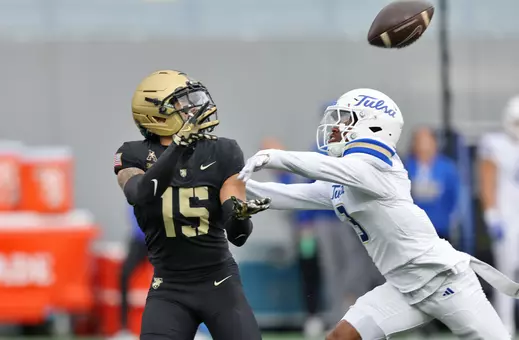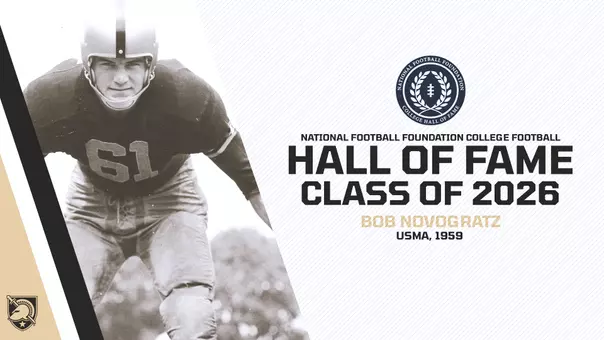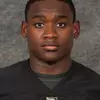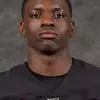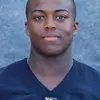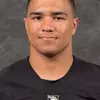Army West Point Athletics
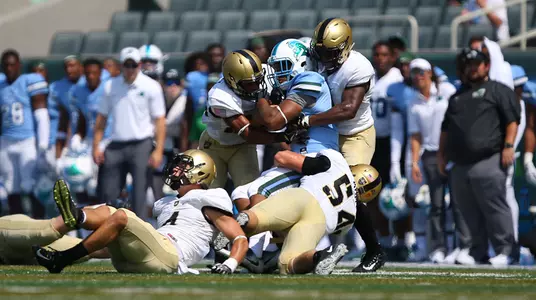
Feinstein's Findings: A Game of Fourth Downs
September 24, 2017 | Football
New York Times bestselling author, John Feinstein, is back for another season with the Black Knights and will report in after each football game during the 2017 season. The weekly report will be posted to GoArmyWestPoint.com following each battle on the gridiron.
There's no point in mincing words today: this one hurt…a lot. This was exactly the kind of game Army has found a way to win the last two seasons, reversing painful pre-2016 recent history.
When you cut through all the statistics; all the good moments and all the bad, the bottom line is that the defense, which has been so good—especially in fourth quarters the past two seasons—simply couldn't get Tulane off the field on the drive that decided the game.
The Green Wave went 75 yards in 19 plays—an Army-like drive—to score the winning touchdown with 23 seconds left.
It was more than that though: Army had three chances to get a stop on fourth down and end the game. Three chances. On fourth-and-7 at the Tulane 27, Jonathan Banks, the well-traveled quarterback for whom Tulane is his FOURTH college, escaped the Army rush and picked up 10 yards before being crushed by James Gibson. It didn't matter. He still had the first down.
Three plays later, on fourth-and-3 at the 44, Banks found Jarnik Clewis for 13 yards. Finally, on fourth-and-1 from the Army six, running back Dontrell Hilliard, picked up two yards. One player later, Banks scored. Final: Tulane-21, Army-17.
OUCH.
Actually one word doesn't begin to describe how much this loss hurt because most of Army's wounds were self-inflicted. The defense gave up two huge plays in the first half: a 75-yard run on the first play from scrimmage, Hilliard bursting straight up the middle untouched; and a 72-yard run on a sweep by Sherman Badie two plays after the Black Knights had seemingly gained control of the game with a long drive, capped by a one-yard run by Bradshaw. Less than a minute after taking a 10-7 lead, Army was behind—again—14-10.
The first half was filled with bad penalties; the two defensive miscues and a fourth-and-1 in Tulane territory that went backwards. All of which mean that being down 14-10 at the half wasn't a bad thing. Perhaps some raised voices in the locker room—most notably Jeff Monken's—and a few adjustments would turn things around.
That's exactly what happened. Army dominated the first 25 minutes of the second half. Nick Schrage didn't punt at all after the break. Only Army stopped Army. The Cadets first drive lasted 11 plays and took them to the Tulane 29, but there—for the second series in a row—they were stopped on fourth-and-1. Ahmad Bradshaw tried to run right, couldn't find his pitch man and got dragged down for a loss of one.
The defense held again and Army began marching again, this time going 10 plays to a third-and-3 at the Tulane 12. Hoping that the element of surprise would work in his team's favor, offensive coordinator Brent Davis called for a play-action pass into the end zone. If he had stayed on the ground and not picked up the first down, Army could have gone for it on fourth-and-short or opted for a Blake Wilson field goal—he'd made a 46-yarder in the second quarter.
Bradshaw has only throw 20 passes in four games this season—completing four of them. He dropped and tried to force the ball to Jordan Asberry in the right corner of the end zone. Asberry was blanketed there by Tulane's Donnie Lewis, who was in perfect position to make the interception.
Two long clock-eating drives had produced zero points.
The interception—Bradshaw's first of the season—brings up (again) the issue of finding some balance on the offensive side of the ball. Army will always be a run-first, second and third team and, most games, that's fine because the Black Knights are so good at it. Even with Darnell Woolfolk home because of a leg injury, Army rushed for 371 yards. Andy Davidson got his first extended time of the season and made the most of it with 130 yards on 26 carries. Calen Holt and Connor Slomka chipped in nicely and Kell Walker, lining up all over the field, picked up 59 yards on just five carries, looking a lot like the player who was one of the keys in the win over Navy last December. He needs to see the ball more often as the season moves along.
But the passing game is a serious issue. It's redundant—but worth bringing up again—to point out that the game-winning drive against Navy began with a 29-yard Bradshaw to Edgar Poe completion. The void left by Poe's graduation simply hasn't been filled and the offense misses the change-up that Chris Carter brought when he subbed for Bradshaw. Carter wasn't the runner or decision-maker that Bradshaw is, but a better passer. And yet, it was Bradshaw who made the most important downfield throw of the season.
The potential is there. Army has a bevy of slotbacks capable of getting open and Bradshaw needs to regain his confidence throwing the ball. Four-of-20 in an offense that throws most often as a change-up, clearly isn't good enough.
Even so, this game was still there to be won. Army got the ball back early in the fourth quarter and began yet another long, grinding drive. With Slomka, fresh in the withering heat, getting a good deal of time at fullback, the Black Knights weren't stopped this time, Slomka going the last five-yards of the 15-play, 76-yard drive to make it 17-14 with 5:32 to go.
At that point, Army's offense had run 37 plays in the second half to Tulane's nine. The Green Wave had possessed the ball for a grand total of 3:50. One more stop by the defense and the likelihood was that the offense could run out the clock against the exhausted Tulane defense.
But the stop never came. It can be argued that Banks's ability to throw the ball just enough—10-of-22 for 103 yards--got Tulane to the goal line and the finish line just ahead of Army. He completed three passes on the final drive, including the second of the fourth down conversions. Equally important, he pulled the ball down and picked up 10 yards on the fourth-and-8 that could have ended the game. He rushed for 39 yards on the drive, including the last four, helped immeasurably by the fact that Army had to respect his ability to pass the ball downfield.
The good news—if there is any—is that college kids tend to be resilient; none more so than those who play football at Army. UTEP—a team Army beat 66-14 in El Paso a year ago—comes to Michie Stadium Saturday with an 0-4 record, none of the losses close.
Last year's game was played a week after Brandon Jackson's death and the Cadets, clearly playing for their fallen teammate, weren't going to be denied that night. This time, they need to find inspiration in a much more mundane occurrence: an extremely difficult loss in a football game.
It should be enough. It had better be enough, because the schedule ahead is full of games that will probably be like Tulane: down to the wire with someone needing to make a play late. That play didn't get made Saturday. If the Black Knights want to live the dreams they began the season with, they will need to look within themselves to make sure that doesn't happen again anytime soon.
There's no point in mincing words today: this one hurt…a lot. This was exactly the kind of game Army has found a way to win the last two seasons, reversing painful pre-2016 recent history.
When you cut through all the statistics; all the good moments and all the bad, the bottom line is that the defense, which has been so good—especially in fourth quarters the past two seasons—simply couldn't get Tulane off the field on the drive that decided the game.
The Green Wave went 75 yards in 19 plays—an Army-like drive—to score the winning touchdown with 23 seconds left.
It was more than that though: Army had three chances to get a stop on fourth down and end the game. Three chances. On fourth-and-7 at the Tulane 27, Jonathan Banks, the well-traveled quarterback for whom Tulane is his FOURTH college, escaped the Army rush and picked up 10 yards before being crushed by James Gibson. It didn't matter. He still had the first down.
Three plays later, on fourth-and-3 at the 44, Banks found Jarnik Clewis for 13 yards. Finally, on fourth-and-1 from the Army six, running back Dontrell Hilliard, picked up two yards. One player later, Banks scored. Final: Tulane-21, Army-17.
OUCH.
Actually one word doesn't begin to describe how much this loss hurt because most of Army's wounds were self-inflicted. The defense gave up two huge plays in the first half: a 75-yard run on the first play from scrimmage, Hilliard bursting straight up the middle untouched; and a 72-yard run on a sweep by Sherman Badie two plays after the Black Knights had seemingly gained control of the game with a long drive, capped by a one-yard run by Bradshaw. Less than a minute after taking a 10-7 lead, Army was behind—again—14-10.
The first half was filled with bad penalties; the two defensive miscues and a fourth-and-1 in Tulane territory that went backwards. All of which mean that being down 14-10 at the half wasn't a bad thing. Perhaps some raised voices in the locker room—most notably Jeff Monken's—and a few adjustments would turn things around.
That's exactly what happened. Army dominated the first 25 minutes of the second half. Nick Schrage didn't punt at all after the break. Only Army stopped Army. The Cadets first drive lasted 11 plays and took them to the Tulane 29, but there—for the second series in a row—they were stopped on fourth-and-1. Ahmad Bradshaw tried to run right, couldn't find his pitch man and got dragged down for a loss of one.
The defense held again and Army began marching again, this time going 10 plays to a third-and-3 at the Tulane 12. Hoping that the element of surprise would work in his team's favor, offensive coordinator Brent Davis called for a play-action pass into the end zone. If he had stayed on the ground and not picked up the first down, Army could have gone for it on fourth-and-short or opted for a Blake Wilson field goal—he'd made a 46-yarder in the second quarter.
Bradshaw has only throw 20 passes in four games this season—completing four of them. He dropped and tried to force the ball to Jordan Asberry in the right corner of the end zone. Asberry was blanketed there by Tulane's Donnie Lewis, who was in perfect position to make the interception.
Two long clock-eating drives had produced zero points.
The interception—Bradshaw's first of the season—brings up (again) the issue of finding some balance on the offensive side of the ball. Army will always be a run-first, second and third team and, most games, that's fine because the Black Knights are so good at it. Even with Darnell Woolfolk home because of a leg injury, Army rushed for 371 yards. Andy Davidson got his first extended time of the season and made the most of it with 130 yards on 26 carries. Calen Holt and Connor Slomka chipped in nicely and Kell Walker, lining up all over the field, picked up 59 yards on just five carries, looking a lot like the player who was one of the keys in the win over Navy last December. He needs to see the ball more often as the season moves along.
But the passing game is a serious issue. It's redundant—but worth bringing up again—to point out that the game-winning drive against Navy began with a 29-yard Bradshaw to Edgar Poe completion. The void left by Poe's graduation simply hasn't been filled and the offense misses the change-up that Chris Carter brought when he subbed for Bradshaw. Carter wasn't the runner or decision-maker that Bradshaw is, but a better passer. And yet, it was Bradshaw who made the most important downfield throw of the season.
The potential is there. Army has a bevy of slotbacks capable of getting open and Bradshaw needs to regain his confidence throwing the ball. Four-of-20 in an offense that throws most often as a change-up, clearly isn't good enough.
Even so, this game was still there to be won. Army got the ball back early in the fourth quarter and began yet another long, grinding drive. With Slomka, fresh in the withering heat, getting a good deal of time at fullback, the Black Knights weren't stopped this time, Slomka going the last five-yards of the 15-play, 76-yard drive to make it 17-14 with 5:32 to go.
At that point, Army's offense had run 37 plays in the second half to Tulane's nine. The Green Wave had possessed the ball for a grand total of 3:50. One more stop by the defense and the likelihood was that the offense could run out the clock against the exhausted Tulane defense.
But the stop never came. It can be argued that Banks's ability to throw the ball just enough—10-of-22 for 103 yards--got Tulane to the goal line and the finish line just ahead of Army. He completed three passes on the final drive, including the second of the fourth down conversions. Equally important, he pulled the ball down and picked up 10 yards on the fourth-and-8 that could have ended the game. He rushed for 39 yards on the drive, including the last four, helped immeasurably by the fact that Army had to respect his ability to pass the ball downfield.
The good news—if there is any—is that college kids tend to be resilient; none more so than those who play football at Army. UTEP—a team Army beat 66-14 in El Paso a year ago—comes to Michie Stadium Saturday with an 0-4 record, none of the losses close.
Last year's game was played a week after Brandon Jackson's death and the Cadets, clearly playing for their fallen teammate, weren't going to be denied that night. This time, they need to find inspiration in a much more mundane occurrence: an extremely difficult loss in a football game.
It should be enough. It had better be enough, because the schedule ahead is full of games that will probably be like Tulane: down to the wire with someone needing to make a play late. That play didn't get made Saturday. If the Black Knights want to live the dreams they began the season with, they will need to look within themselves to make sure that doesn't happen again anytime soon.
Players Mentioned
Army vs. Bucknell Women's Basketball Game Highlights
Thursday, January 22
2026 West Point Open (Army Spotlight)
Saturday, January 17
Army Women's Basketball Ericson Feature
Friday, January 02
Wasabi Fenway Bowl Game Highlights
Saturday, December 27


